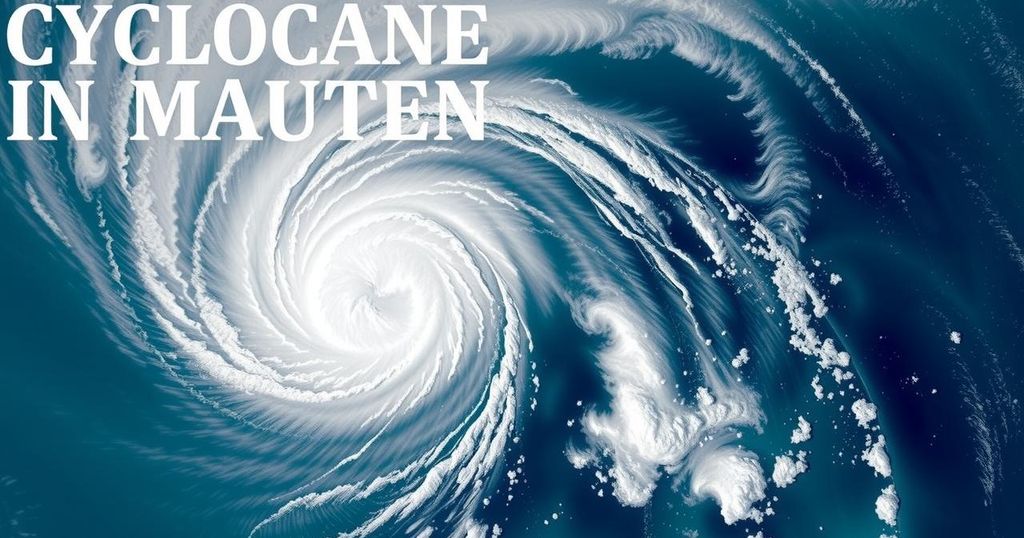Cyclone Chido’s Devastation in Mayotte: Climate Change and Increasing Storm Intensity

Cyclone Chido has struck Mayotte, resulting in at least 22 deaths and significant damage. It is the most intense storm in 90 years, fueled by rising ocean temperatures linked to climate change. Early warning systems in Africa are critically lacking, impacting disaster preparedness. The pandemic serves as a crucial case for improving weather forecasting access to mitigate future impacts of such storms.
The Indian Ocean archipelago of Mayotte is grappling with the aftermath of Cyclone Chido, the most severe storm to strike the territory in nearly a century. Since its landfall on Saturday, the cyclone has claimed the lives of at least 22 individuals, devastated entire neighborhoods, and caused significant damage to infrastructure and vegetation. As the region often faces destructive cyclones, experts indicate that climate change is exacerbating the frequency and intensity of such storms.
Southeast Africa’s cyclone season spans from December to March, coinciding with the warmest ocean temperatures, which are critical in driving tropical storm formation. Recent history includes severe storms like Cyclone Freddy in 2023 and Idai in 2019, all wreaking havoc across several African nations during this period. In this region, cyclones are equivalent to hurricanes, differing only in nomenclature based on geographic location.
The influence of climate change on cyclonic activity is profound, with human activities associated with fossil fuel consumption contributing to a 1.3 degrees Celsius increase in the planet’s temperature since pre-industrial times. This rise significantly affects sea surface temperatures, which must reach at least 27 degrees Celsius for cyclone development. Cyclone Chido thrived in ocean conditions that peaked at 29 degrees Celsius, resulting in stronger winds and increased precipitation associated with this storm.
The environmental challenges are compounded by the stark lack of early warning systems across much of Africa. Current estimates indicate that there are merely 37 radar facilities on the continent for weather tracking, compared to hundreds in Europe and North America. This deficit hampers effective preparations for severe weather events, leading to a heightened risk of casualties and property damage, as seen in previous disasters.
In response to these vulnerabilities, the United Nations has initiated a project aimed at ensuring global access to early warning systems within five years. Celeste Saulo, the secretary-general of the World Meteorological Organization, has emphasized the urgency of improving weather forecasting as an essential step in adapting to climate change.
Through greater accessibility to reliable weather data and early warning systems, the aim is to mitigate the destruction wrought by such natural disasters and improve community resilience.
The recent experience of Mayotte with Cyclone Chido highlights the growing threat posed by intense cyclones linked to climate change. Climate scientists have indicated that warming ocean waters, attributed to human-caused climate change, are increasing the severity and frequency of tropical storms in the southeast African region. This phenomenon not only exacerbates natural disasters but also underscores the need for better disaster preparedness and mitigation strategies in vulnerable areas. Historical data show that the cyclone season in southeast Africa typically encompasses the warmer months of December to March, which correlates with the peak hurricane activity as warmer waters fuel storm development. Furthermore, the infrastructural deficits regarding early warning systems in African nations present significant challenges to effective disaster response and public safety.
Cyclone Chido’s impact on Mayotte serves as a stark reminder of the escalating threats posed by climate change to vulnerable regions. With climate scientists warning of more intense storms, enhancing early warning systems and disaster preparedness is critical in mitigating loss of life and infrastructural damage. The urgent call for improved weather forecasting and data accessibility reflects a necessary step toward safeguarding communities against the increasing frequency of natural disasters, emphasizing the importance of both international cooperation and effective climate adaptation strategies.
Original Source: www.seattletimes.com






